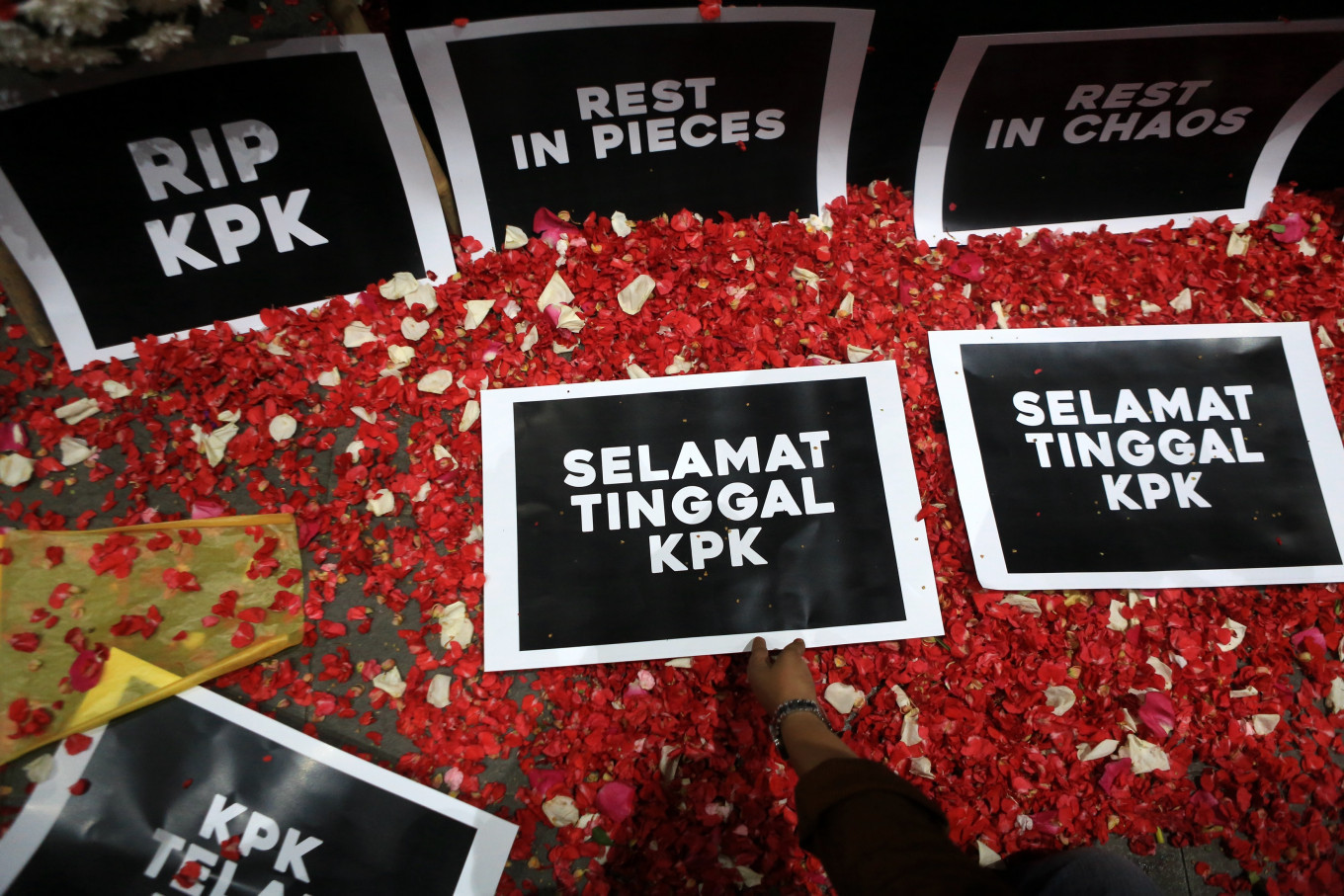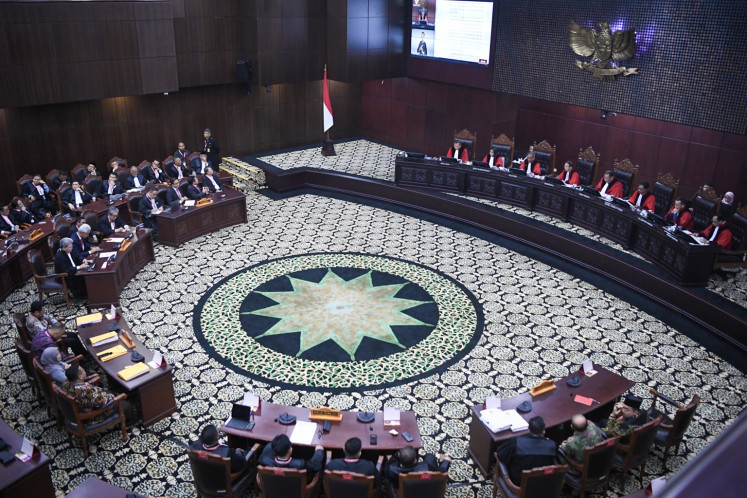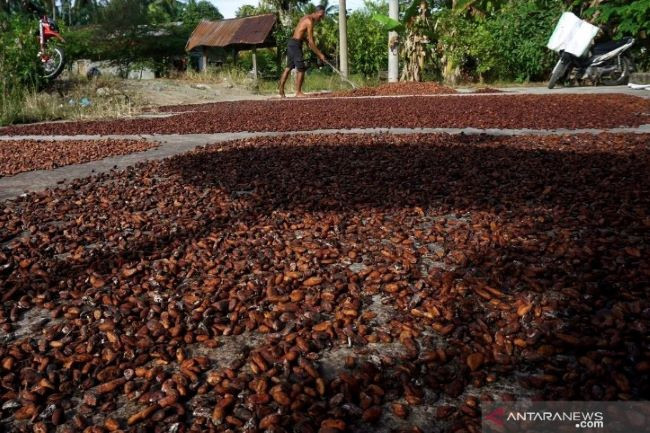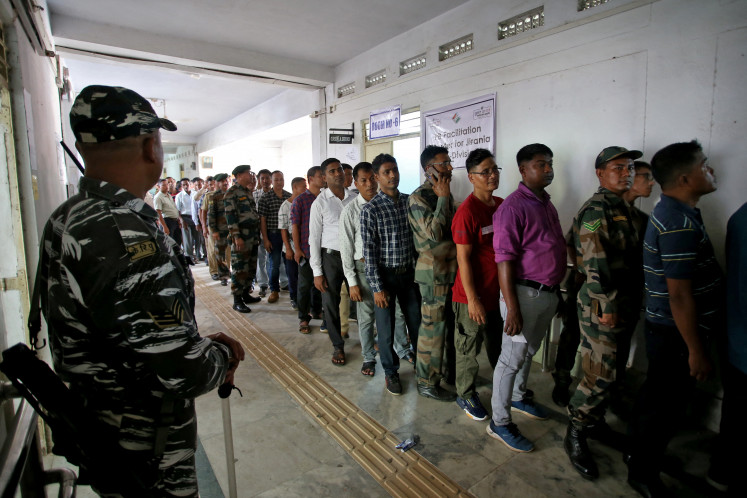Forget KPK, we need a sharper weapon to fight graft
The KPK may have been an effective weapon in sending big time corruptors to jail in the past, but it’s no magic wand, and now it is looking like it is passing its use-by date.
Change Size
 Rest in peace: Employees at Corruption Eradication Commission (KPK) lay flower and wreaths on top of a casket in front of the KPK's headquarter in Kuningan, Central Jakarta, on Friday, Sept. 13, 2019. This is after the House of Representative elected Insp. Gen. Firli Bahuri from the National Police as KPK's new commissioner and President Joko (JP/Seto Wardhana)
Rest in peace: Employees at Corruption Eradication Commission (KPK) lay flower and wreaths on top of a casket in front of the KPK's headquarter in Kuningan, Central Jakarta, on Friday, Sept. 13, 2019. This is after the House of Representative elected Insp. Gen. Firli Bahuri from the National Police as KPK's new commissioner and President Joko (JP/Seto Wardhana)
W
ith the Corruption Eradication Commission (KPK) coming under siege from left and right, many people have already written its epitaph, while others still have high hopes and are campaigning to save it. At stake is not the KPK itself, which is likely to continue in a different form, but its independence and hence its effectiveness in leading the nation in fighting graft.
Now that its enemies are looking to succeed in defanging the KPK, is it still worth saving it? Maybe not. But we should not mourn its passing either.
The KPK may have been an effective weapon in sending big time corruptors to jail in the past, but it’s no magic wand, and now it is looking like it is passing its use-by date.
The commission was born out of the reform movement when the nation agreed that rampant and unchecked corruption during the Soeharto regime was the single biggest cause for bankrupting and sending Indonesia into its worst economic recession in 1998.
The KPK was created as a shock therapy to stop corruption. To be effective, it had extraordinary powers, combining the work of the police and prosecutors into one, and the power to wiretap that it needs to catch people in the act. And it works in close collaboration with the special corruption courts set up around the country.
The 2002 legislation on the KPK went through three presidents. The bill was introduced under Abdurrahman Wahid and passed into law in 2002 under Megawati Soekarnoputri. The KPK was only formed and started working after Susilo Bambang Yudhoyono came to office in 2004.
Given the immense tasks at hand, the KPK would handle selective high profile corruption cases involving at least Rp 1 billion (US$71,000), leaving other corruption cases in the hands of the National Police and the Attorney General’s Office.
The KPK became a superbody that has sent to jail many powerful figures, from former Cabinet ministers, top judges and government prosecutors to police generals and politicians, including the speakers of the House and Regional Representatives Council.
Given the nature of its work, the commission has many enemies and very few friends. The only reason why it has survived many attempts to kill or curtail its powers is because, each time, the public always rallies behind it to save the commission and its independence.
If anyone is looking for someone to blame for the KPK’s inevitable demise, one has to look at the KPK’s performance in the past five years. The current commissioners, who are due to end their term in December, have overplayed their hands, going arbitrarily after every single corruption case they could lay their hands on, even those below the Rp 1 billion mark.
Hardly a night has gone by without KPK commissioners making TV appearances announcing their latest catch. They have enjoyed a high public profile, but at the expense of the high profile corruption cases they should be going after. Many cases they handled went pending for months if not years, and court convictions have become fewer, and many corruptors got off lightly.
The KPK is losing its effectiveness and recent external factors only speed up the process that began internally.
The House of Representatives, ending its five-year sitting, this month picked five new commissioners, including a senior police officer with questionable ethics to head the KPK starting in December. The House has submitted a bill, an all-partisan initiative, to revise the 2002 law on the KPK that would remove its independence and much of its powers. Ironically, the House has the cooperation of President Joko “Jokowi” Widodo, the one person who could put a stop to it, in making sure the legislation is enacted.
There is no stopping them, not even with petitions and protests.
With the new House members and President already assured of their places after the April general election, they are blatantly ignoring public opinion. They are not the ones who are killing KPK but they will be the ones putting the last nail in the coffin.
The KPK has served its purpose well in the past. Those who created the KPK legislation in 2002 knew that it was meant to be temporary, but they forgot to write the expiration date. That time seems to be now.
The nation’s antigraft campaign, however, will not stop with the demise of the KPK, or as it’s likely the case, a much less independent and powerless KPK. Indonesia has remained as corrupt as when the KPK began its work in 2004, if not more so.
This is not the time to rest, but it is time for new and more innovative approaches.
Whatever tools we come up with, they have to involve wider public participation. We need to use free speech and internet technology to the full extent possible as part of any public campaign against corruption. The free and independent media, for one, should be part of the campaign, doing investigative reporting and uncovering corruption scandals that the KPK won’t handle. If we can’t send them to jail, we can at least name and shame them.
The fight against corruption will continue, with or without an independent KPK.









